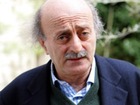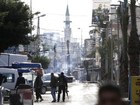The controversial appointment of top civil servants in state posts is witnessing a breakthrough after President Michel Suleiman and Free Patriotic Movement leader MP Michel Aoun agreed to make compromises to resolve the crisis, As Safir newspaper reported on Thursday.
Concerning the head of the Higher Judicial Council post, Suleiman is no longer holding onto his candidate judge Alice Shabtini, while Aoun agreed to reconsider his nomination to judge Tannous Meshleb.
 Full Story
Full Story
Efforts will be exerted to pressure Progressive Socialist Party leader Walid Jumblat not to obstruct the adoption of a proposal by Interior Minister Marwan Charbel on a new electoral law based on proportional representation, ministerial sources said Thursday.
The sources told An Nahar newspaper that attempts will be made to persuade Jumblat into allowing the cabinet ministers loyal to him to approve proportionality for the 2013 parliamentary elections.
 Full Story
Full Story
The cabinet approved on Thursday LL10,394 billion to cover the expenses of state institutions in 2012 and LL600 billion to carry out development projects in Tripoli and other areas across Lebanon, a major breakthrough following months of wrangling on the extra-budgetary spending.
Following a session held under President Michel Suleiman at Baabda palace, Information Minister Walid al-Daouq said the LL10,394 billion would come in the form of a credit to cover the expenses of institutions for the rest of the year.
 Full Story
Full Story
Head of the parliamentary energy committee MP Mohammed Qabbani stressed on Thursday that the disputed 854 square kilometers maritime zone belongs solely to Lebanon’s Exclusive Economic Zone.
The area, which Lebanon and Israel are bickering over, contains suspected energy reserves that could generate billions of dollars.
 Full Story
Full Story
Sniper gunshots were fired on Wednesday at Syria Street, which separates the rival Tripoli neighborhoods of Bab al-Tabbaneh and Jabal Mohsen, as a hand grenade exploded in the neighboring Baal Al-Darawish area, National News Agency reported.
No gunmen were visible in Bab al-Tabbaneh, amidst complete shutdown of shops and stores, reported NNA.
 Full Story
Full Story
United Nations Special Coordinator for Lebanon Derek Plumbly expressed Wednesday his concern of the security situation in the northern city of Tripoli, urging for “more lasting solutions” to end the clashes.
 Full Story
Full Story
Speaker Nabih Berri stated on Wednesday that the Baabda Palace meeting on Tuesday tackled the need to reactivate the government’s functioning.
His visitors quoted him as saying: “The gatherers agreed to tackling the government spending dispute and the need to complete the 2012 state budget.”
 Full Story
Full Story
The Higher Islamic Shiite Council urged on Thursday the families of 11 pilgrims kidnapped in Syria to exercise self-restraint and remain calm.
Following a meeting held between the deputy head of the Council, Sheikh Abdul Amir Qabalan, and the families of the abductees, a statement urged Turkey to intensify its efforts to release the men.
 Full Story
Full Story
Lebanese Forces leader Samir Geagea stressed on Wednesday that the March 14 camp insists on holding the 2013 parliamentary elections on time.
He said before an LF delegation: “Hizbullah will do all it can to prevent the staging of the elections.”
 Full Story
Full Story
Clashes broke out Wednesday between Syrian troops and residents of the border town of Arsal in eastern Lebanon after a Lebanese man was killed and two wounded at dawn along the Lebanese-Syrian border.
Security sources said that rocket-propelled grenades and automatic weapons were fired during the clashes at Kherbet Daoud, an area on the outskirts of Arsal.
 Full Story
Full Story



